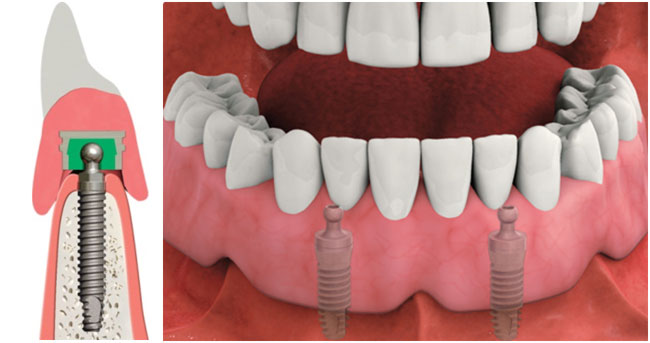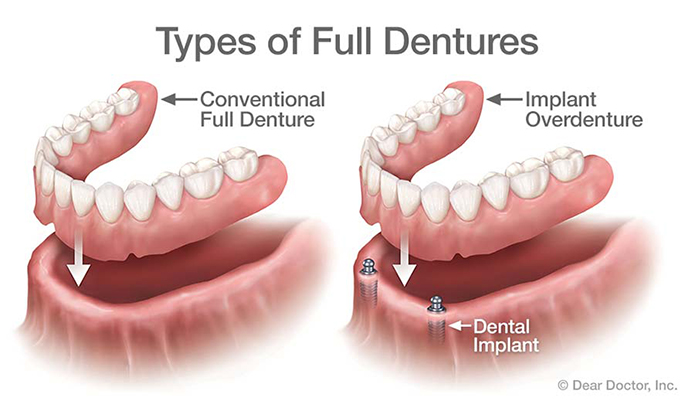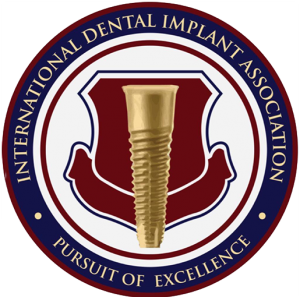What Is The Difference Between Dentures And Over Denture
One type of implant-supported denture that I place is called an “overdenture.” This type of dental implant forms a gum-supported base onto which a removable denture can be placed; overdenture implants are typically performed on the bottom teeth. But what are the fundamental differences between a standard denture and an overdenture, and why would someone choose an implant overdenture as opposed to a full or partial traditional denture?
For a standard denture to be placed the patient will be fitted for the device and any remaining teeth must be extracted. Sometimes the dentures will be cemented onto the gums, but sometimes it will be placed with removable adhesive. Without extracted teeth’s previous support, the gum ridge will begin to collapse and the mouth will develop a sunken look. Since the gum ridge flattens over time and the tongue tends to knock traditional dentures loose, such a device can become a nuisance at best or even a serious inhibitor to such basic functions as eating and speaking. These and similar minor disturbances in the oral cavity can constitute a major disruption to one’s quality of living. Fortunately, potential denture patients now have access to an alternative by choosing the implant overdenture.
To start the process of constructing your custom overdenture, I begin by surgically placing the implants into your jawbone to serve as anchors for the overdenture itself. Typically the overdenture is made for the bottom teeth, since traditional dentures remain less stable on the lower arch than the upper due to the lower ridge’s u-shape, lack of osmotic pressure, tongue movement, and other factors. After I place the implants in the gums, I will use locators (ball and socket arrangements) to attach the removable prosthetic denture to the implants. The locators and the attachments ensure that the denture will not inconvenience the patient by sliding or shifting in the mouth.

The advantages of overdentures are great. Often people choose implant overdentures over conventional dentures because implants offer a conservative way to add retention, stability, and comfort to the edentulous patient. Instead of sliding freely around the gum area, the denture remains snugly in place in the mouth because it is anchored to the implants. One way this benefits the patient is by allowing her to maintain her dietary health. While someone with traditional dentures must stay away from chewy or hard foods for fear of dislodging the denture, someone with an implant-secured overdenture can maintain his ability to adhere to his regular diet, fully chew his food, and absorb vital nutrition.
Furthermore, the implants themselves help stop facial-contour deterioration, improving not only the physical but also the mental well-being of implant overdenture wearers. Ordinary dentures cause facial bone loss, perpetuating jaw collapse and premature aging. Such facial bone collapse occurs because after one’s teeth are removed and one begins to wear a denture, the denture speeds up bone loss by deteriorating the bone ridges where the denture is placed. Moreover, the jaw area increasingly disintegrates in the areas where the teeth have been extracted. Fortunately, the implants I place for the overdenture provide support for the jaw and gum area, since the implants will naturally integrate with live gum and bone, fortifying the jaw line and preventing bone resorption and facial bone loss. Such osseointegration not only keeps the facial bones physiologically healthy, but it also improves the psychological health of wearers by allowing them to speak, eat, smile, and maintain their natural appearance with increased confidence.
Overall, implant overdentures present a more comfortable, healthy, and durable option than traditional dentures. The implants keep the denture secured in place, allowing the patient to converse with confidence, participate in normal social interactions, and even enjoy a diverse diet for optimal nutritional health. Moreover, the implants keep the facial contours and jaw line from collapsing, allowing edentulous patients to maintain bone retention and actually strengthen the jaw line.


